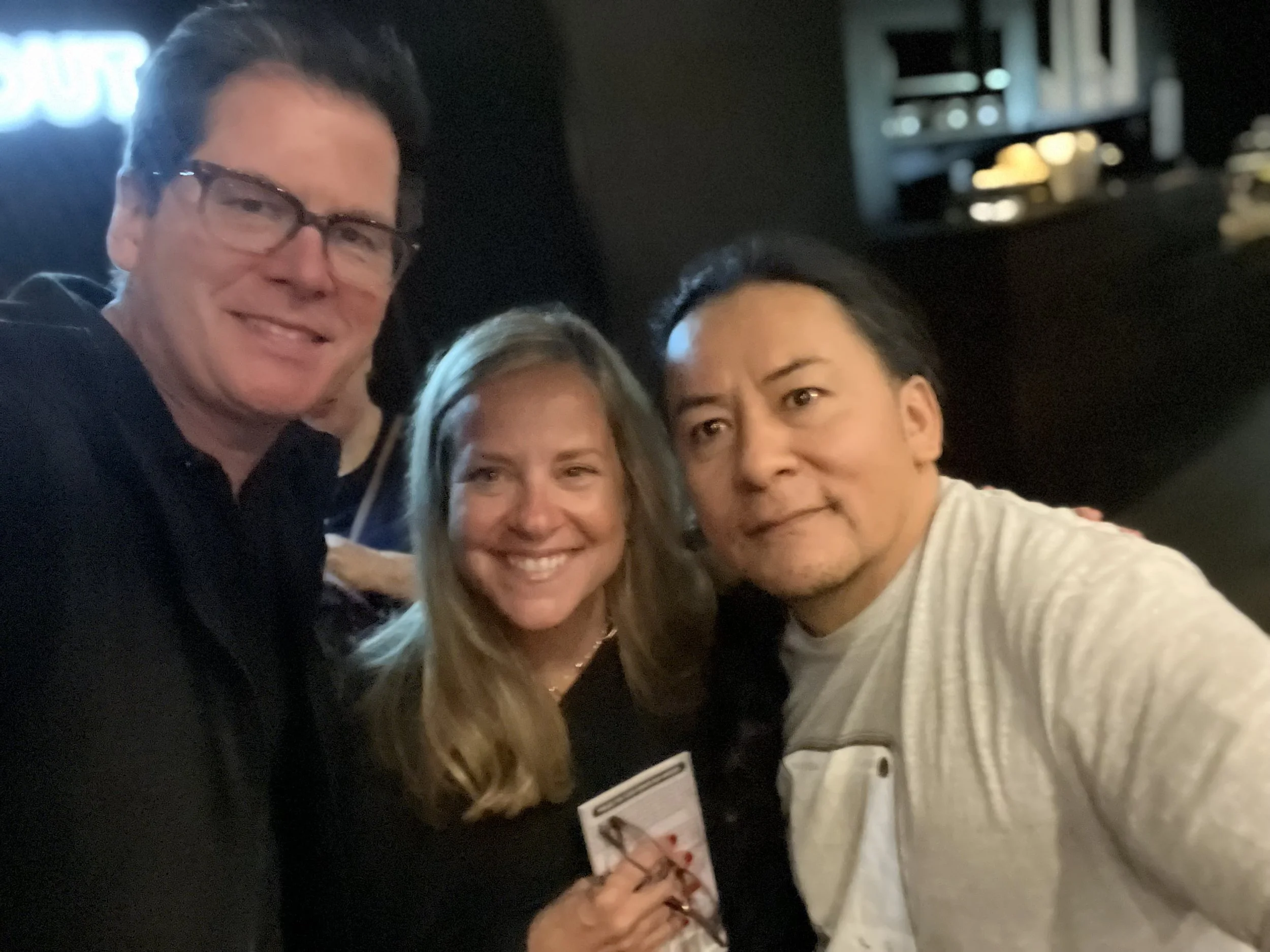I Have To Work Hard To Be Happy
Optimism isn't a constant for me; it's more like a personal crusade. I envy those for whom contentment comes naturally, and I'm grateful I can always turn to writing to guide me toward well-being.
Lately, I’ve been researching happiness for my third book, a memoir about sisterhood lost and found.
If you’ve written — or read — memoir, you know it requires intense personal reflection and vulnerability. Let’s just say, I’m in the thick of it.
As I write about suddenly losing one sister, then (unexpectedly) finding another, I can’t help but consider the chasm between grief and happiness.
It occurs to me that, while I’m intimately familiar with grief and loss, the idea of happiness — something so accessible and natural for some — has often been so elusive for me. Happiness is something I often work hard toward, rather than feeling it without effort. Some of us have to work hard to be happy. Can anyone else relate?
A Daily Grind?
For example, let’s, for a moment, put aside life experience and circumstances — specifically, stressors and challenges — and consider one of my typical mornings.
I stand before the coffee pot, watching my first cup brewing, eagerly looking forward to that first sip. I have a packed schedule ahead of me, filled with interesting people and projects. My kids are all healthy and thriving. My parents are still alive and well. All around me, love abounds. Plus, the sun is shining. And for the 7th week in a row, I haven’t found a mouse or killed a single houseplant.
So why is it, then, that instead of drinking in all this positivity with my morning joe, my brain instinctively turns to all that I haven’t done and all my shortcomings and all that I fear might happen if I fail to stay hyper-vigilant? It sucks when we have to work hard to be happy.
Why must I regularly default to deficiencies, rather than delectation?
Getting Out of My Head
One might say, “Jeez, cut yourself some slack. It’s only 7:30 in the morning,” or even, “Hey, you’ve gone through a lot in your life, so it’s natural that you’d carry things like low self-esteem, C-PTSD, blah blah blah.”
For quite some time, I accepted those lines of thinking (because they’re not incorrect), but I understand more now. So much more.
I don’t think it’s a coincidence that, as I wrote this piece, my youngest son mentioned one of his favorite bands, The Lemon Twigs, and their song, In My Head.
Here are the lyrics, and here’s the Lemon Twigs’ video:
After listening to that song and reading those lyrics, I refuse to keep my thoughts in my head.
Looking back through my 55 years, I realize that, long before my sister passed away, and long before tragedy ever touched my consciousness, I’ve almost always navigated life with intense concentration and effort.
While there’ve been very kind and complimentary terms to describe my approach (ie., “You’re such a determined, tenacious, curious person!”), it’s not been lost on loved ones, therapists, and even strangers that I spend a great deal of time analyzing, assessing, deconstructing, interpreting, and considering life as I go…perhaps more than some. And I know they’re not wrong. Perhaps my behaviors are hallmarks of being a writer? Perhaps they’re activities that have helped me survive as a human being.
Despite so much good fortune (and some outward appearances), I often find myself internally searching for — and actively working to feel — happiness. As I write this newsletter on a sunny autumn day in my backyard, it occurs to me that my constant ache to feel happiness is not everyone’s experience —- and quite frankly, I’m jealous.
To be sure, not every minute of life can be filled with joy and peace and serenity. Not every season is marked by contentment and acceptance. But even as I sit here typing with a calm, gentle breeze blowing softly against my face and an ability to communicate with and navigate the world as an independent woman, I’m keenly aware of the lifelong sense of urgent, disquiet flowing through me. It’s an unsettling feeling of unrest and unfinished business, and it sometimes eats me alive if I don’t tend to it.
But what IS “it”?
Whatever “it” is, I’ve come to understand that when happiness eludes me, it’s neither accurate nor fair to assume I’m down, morose, or depressed. I think there’s a rarely-acknowledged, middle space between happiness and unhappiness — it’s called thoughtfulness — and it’s more than okay to hang out there, free of judgment from self OR others. Think about the times you’re just existing…or zoning out…or chilling…or on auto-pilot. In this liminal space, one that’s captured by Andrew Heath in his instrumental piece titled, The Space Between Happiness and Sadness, we are living…and that’s more than enough.
Pressure Cooker
But the pressure to be happy…to smile…to be upbeat…to be positive…to keep my chin up…to burst with joy…to grin from ear to ear…to walk on air…to be tickled pink…to be happy as a lark…to feel on top of the world or on cloud nine or over the moon…to have the time of my life…to grin like a Cheshire cat…to be in seventh heaven…it’s just…sometimes…too…much.
I mean, I love being happy and I know how to be happy and I experience happiness all the time. I love the people in my life and I feel loved by them; I love what I do for a living and I know I’m making a difference in others’ lives. These days, I lead a very satisfying, rewarding life, one that brings immense peace and, yes, joy. And yet, there’s always an undercurrent I have to manage, one that whispers and meanders in a maddening, run-on voice:
Careful now, this could all go away in a flash, so don’t get too used to any of it or assume any permanence because, well, you know the alternatives, and they don’t look anything like this…
Labels
Those who love me deeply have often told me that the unsettled, discomfort I feel is actually my persistence, grit, tenacity, having high standards, perfectionism, mettle, spirit, or (my personal fave,) moxie. I cling to these terms and phrases, especially after those who’ve loved me less have labeled me as petty, never satisfied, reluctant to see the glass as half full, “stirring the pot,” living at an unnecessarily high level of drama, or simply refusing to be happy. Not surprisingly, each of those judgmental comments only fueled and reinforced the very approach I was criticized about, sending me back into a spiral of analyzing, assessing, deconstructing, interpreting, and considering my relationships. It’s been a vicious cycle, one that I’m grateful I finally broke.
As hard as it was to untangle and/or boundary myself from those unhealthy relationships, I’ve spent more and more time over the past several years with a feeling of self-acceptance, which has led to…wait for it…a greater sense of ease and happiness.
The more I allow self-acceptance, the greater my sense of ease and happiness.
It sounds simple, right? Loving myself and letting go of the people and things that don’t serve me will help me to live a happier, more satisfying life. I mean, duh. But oh, if only it was that simple. Relationships and interpersonal dynamics, as you know, are so f-ing complicated.
Validation
Over the past decade, I’ve worked hard to understand the impact of having grown up surrounded by many who struggled with mental health challenges and substance abuse disorders. I’ve also come to better understand and consider the role Complex Post Traumatic Stress Disorder (C-PTSD) continues to play in my life. I mean, how can my worldview NOT be influenced by the fallout of abuse, sexual assault, a near death experience, or the sudden death of a loved one?
And, perhaps most importantly, I’m only beginning to recognize and appreciate the genetic influences that shape who I am.
Science
For instance, I’d love to know how my particular genetic makeup impacts the main happiness chemicals (neurotransmitters) in my body, including endorphins (which help us deal with stress and minimize feelings of pain), serotonin (which stabilize mood, including feelings of wellbeing, happiness, and joy), dopamine (which impacts the brain’s reward center; think of pleasure, satisfaction, and motivation), and oxytocin (known as the “bonding” chemical, influencing feelings of love and trust).
All I have to do is look around and see how others navigate life (or don’t) to recognize the role these chemicals play in happiness. There’s no need to formally test my neurotransmitters to convince me that my genetic makeup likely lags behind others’ in terms of a natural happiness quotient (NHQ*).
*Natural Happiness Quotient (NHQ) is a term I just made up. Maybe someone else has already coined it? If not, you read it here, folks.
While certain entities (and even countries) do incredible things to focus on happiness (for instance, see Bhutan and its dedication to Gross National Happiness (GNH) and Gross Domestic Happiness (GDH)), what I’m talking about has nothing to do with critically important factors like sustainable and equitable socio-economic development, environmental conservation, preservation and promotion of culture, or good governance.
What I’m talking about is being happy in one’s soul.
Posers
Don’t get me wrong. There are so many posers out there pretending to be happy, and social media’s been the perfect tool — the ideal curtain — with which we can hide our true, soulful selves. I see and recognize others’ efforts to deflect unhappiness and project jubilation, and I’m not focused on those efforts. I find them cringy, comical and sad.
I’m also not looking for unrealistic optimism or endless euphoria or manufactured bliss.
Obviously, we can’t always be happy, and at times, happiness takes work for everyone. Sometimes, there’s just too much other real stuff clogging the happiness pipeline, requiring some of us to work to make room for happiness. I know that’s the case for me. I wish it wasn’t, but to believe otherwise would be delusional.
And so, for those who share this journey, let’s be realistic and cut ourselves some slack. There are reasons, very SOLID, evidenced-based reasons, that we might struggle. Our challenges are real, and they do not constitute character flaws.
When we have to work harder to be happy, it’s not a matter of being difficult or closed off or stubborn or pathological (yep, someone once labeled me that, too — then apologized for projecting their own emotional struggles onto me. That was a gas, let me tell you).
Screw Off
If anyone tells you that you need to work harder to be happy, you have two choices, neither one of which requires you to become defensive. You can either 1) look them in the eye and explain what you’re dealing with, or you can 2) walk away. When you’re doing your best and someone still claims you’re intentionally staying unhappy, it’s important to remember that you’re not dealing with someone who (at least in the moment) can see or appreciate your reality. People are not mind readers, though, so make sure you’re clear with them where you stand and what you’re dealing with. Though you don’t have to open up a Pandora’s Box and spill all the beans, it’s essential to signal that you’re managing stuff.
It’s also very important to note: there will be moments in life when we can’t see how unhappy we are until someone else points it out to us. In those instances, our natural response may be to become defensive. After all, it’s a jolt to the system when someone else sees what we cannot see about our own selves.
Still, once we recover from the shock, the best thing we can do is communicate. Try saying something like, “Thanks for pointing out how down I’ve been. I have a lot on my mind that I hadn’t really stopped to consider,” or, “You’re right. I’ve been unhappy. Thanks for opening up the conversation,” or, “Wow. I hadn’t stopped to check in with my feelings lately. Can you give me some time to think about things? Thanks for noticing.”
Still, if others weaponize your unhappiness and use it against you, you know by now what my position is.
You Doing You
Ultimately, I believe it’s important to have one thing that is just yours…that no one can take away or pull apart or take credit for and claim as their own. For me, that thing is writing. Even if I’ve had a bad day…even if others around me struggle…even if things don’t make sense and the world is (literally) shut down…I can still turn to writing to find myself…and my soul. My hope for you is that you, too, have something to turn to that’s your own, and I’d love to hear what it is.
How have you dealt with others who’ve been uncomfortable with your unhappiness?
How do you actively find happiness?
I was a hot, sweaty, insecure mess when this photo was taken during the summer before 4th (or 5th?) grade. Mom had signed me up for the Hoffman Estates (Illinois) Park District PeeWee League. I cheered my heart out that summer for the Cowboys — and for the first boy I ever had a crush on, whose initials were R.C.
Sincerely,
Christine
Author | Speaker | Writing Coach
www.christinewolf.com
Pre-order my book: Politics, Partnerships, & Power: The Lives of Ralph E. and Marguerite Stitt Church (coming December, 2023)
The very first biography of a 20th-century powerhouse couple who, with prescient and persistent methodologies and hearts, gave four decades of legislative service and established much of Illinois’ dedicated political tradition. Spanning the awkward dance of prohibition in Evanston to Marguerite Stitt Church's involvement in the creation of Peace Corps — with a particular focus on her remarkable legacy as a pioneer for women in government — this historical nonfiction is both a resource and a gripping delight."
From May 9-13, 2023, I hosted the Write to Heal Retreat in Carefree, Arizona. Subscribe to this newsletter for updates about upcoming retreats, online write-ins, and more:
Subscribe to my FREE Substack newsletter
Download my Free PDF of Writing Tips
Resources
Centers for Disease Control
Understanding the Opioid Overdose Epidemic
https://www.cdc.gov/opioids/basics/epidemic.html#:~:text=The%20first%20wave%20began%20with,overdose%20deaths%20involving%20heroin4
The Harvard Gazette
How to Live a Happy Life
https://news.harvard.edu/gazette/story/2017/04/over-nearly-80-years-harvard-study-has-been-showing-how-to-live-a-healthy-and-happy-life/
Parkinsons New South Wales
Four Happiness Hormones
https://www.parkinsonsnsw.org.au/four-happy-hormones/#:~:text=Here%20are%20the%20main%20happiness,role%20in%20brain's%20reward%20system:
Disclaimer: This post contains affiliate links. If you purchase a book using a link above, I earn a small commission (at no cost to you) which I then apply to the continuing research and production of this publication. Thank you!







